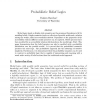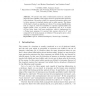1027 search results - page 8 / 206 » Representing and Reasoning with Operational Semantics |
119
Voted
FUZZIEEE
2007
IEEE
15 years 3 months ago
2007
IEEE
An ordinal fuzzy linguistic Information Retrieval System (IRS) based on a multi-level weighting scheme to represent the user queries, in a more flexible way, is proposed. The IRS a...
101
Voted
PSSS
2003
15 years 1 months ago
2003
: RDF-based tools promise to provide a base for reasoning about metadata and about situated data—data describing entities situated in time and space—that is superior to alterna...
ECAI
1990
Springer
15 years 3 months ago
1990
Springer
Modal logics based on Kripke style semantics are the prominent formalismin AI for modeling beliefs. Kripke semantics involve a collection of possible worlds and a relation among t...
98
Voted
ISMIS
1994
Springer
15 years 3 months ago
1994
Springer
We assume that safety of information stored in a database depends on the reliability of the agents who have performed the insertions in the database. We present a logic S to repres...
100
click to vote
CSL
1999
Springer
15 years 3 months ago
1999
Springer
Abstract. This paper represents the beginning of a study aimed at devising semantic models for true concurrency that provide clear distinctions between concurrency, parallelism and...


